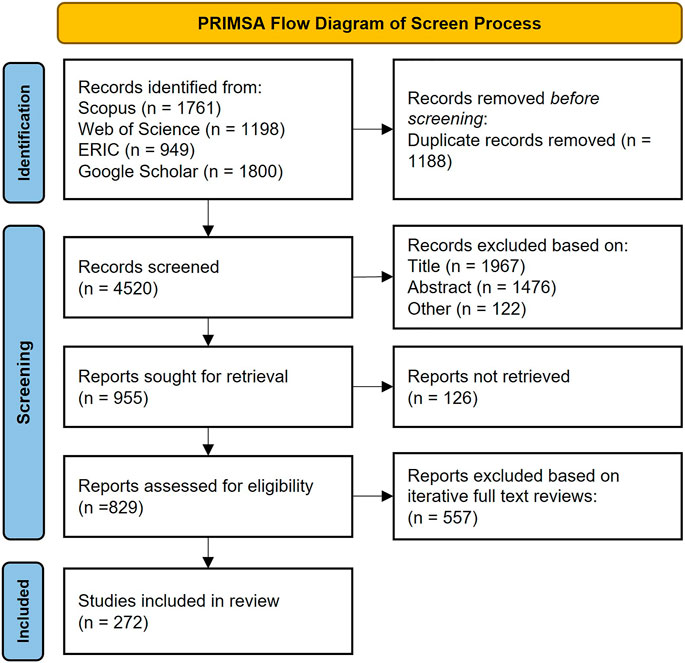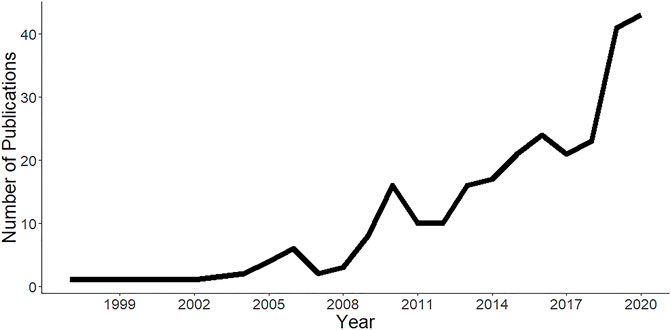- 1School of Sustainability, Arizona State University, Tempe, AZ, United States
- 2Center for Global Sustainability and Cultural Transformation, Leuphana University of Lüneburg, Lüneburg, Germany
- 3Center for Global Sustainability and Cultural Transformation, Arizona State University, Tempe, AZ, United States
Advancing transformations towards sustainability calls for change agents equipped with a new set of competencies. Such sustainability competencies have been articulated with multiplicity and ambiguity, which is counterproductive to joint and accelerated progress. A unified framework of sustainability learning objectives would provide guidance to students, educators, and administrators of sustainability programs. To this end, we carried out a systematic review of the relevant literature. After scanning thousands of publications, we identified over 270 peer-reviewed articles of highest relevance, spanning two decades. Despite appearance otherwise, we found that there is a high level of agreement among scholars over the sustainability competencies that students should be trained in. Expanding on the five key competencies, namely, systems-thinking, anticipatory, normative, strategic, and interpersonal competence, that have gained widespread use, this article synthesizes the new suggestions made over the past decade into a unified framework. It centers on 8 key competencies in sustainability (the 5 established and 3 emerging—intrapersonal, implementation, and integration competence), which are complemented by separate disciplinary, general, and other professional competencies. This comprehensive framework of key competencies in sustainability is applicable across disciplines and can guide faculty, students, and practitioners in their joint efforts to advance transformations towards sustainability.
Introduction
To achieve the Sustainable Development Goals (SDGs) by addressing persistent sustainability challenges such as climate change, biodiversity loss, and socio-economic injustices requires ambitious and whole-scale transformations of societies worldwide (UNESCO, 2017; Scoones et al., 2020). Facilitating these transformations will require novel approaches (Linnér and Wibeck, 2019) that ought to be carried out by change agents who are educated in sustainability and sustainable development (Franco et al., 2019; Redman et al., 2021). In response, the number of sustainability programs at universities and colleges has substantially increased worldwide—to over 1,500 in the United States alone over the past decade (Weiss and Barth, 2019). Yet, critics have long noted that most of this education hews too close to the status quo (Orr, 2003) and graduates of these programs are equipped only to make incremental improvements, instead of being the change agents capable of advancing transformations (Gordon et al., 2019). The characteristics of such transformational change agents should be reflected in the learning objectives of sustainability programs.
Yet, there still remains a lack of clarity and coordination regarding a unified framework of sustainability learning objectives (O’Byrne et al., 2015), which undermines effectiveness, innovation, and legitimacy of such programs (Vincent and Focht, 2009). Guidance is unlikely to come via high-level policy (Mochizuki, 2016), as neither the UNDESD, nor the more recent SDG 4.7, which calls for Education for Sustainable Development (ESD) globally (Giangrande et al., 2019), provide any explicit learning objectives, let alone a coherent framework for advancing transformations. In contrast, UNESCO has articulated how key competencies in sustainability can be utilized to develop educational programming around all seventeen of the SDGs (UNESCO, 2017).
Scholarly reviews of university sustainability programs (Trencher et al., 2018; Salovaara et al., 2020) and expert surveys (Rieckmann, 2012; Demssie et al., 2019; Brundiers et al., 2021) have brought those perspectives into the scholarly literature. At the same time, the growing number of scholarly works on sustainability learning objectives in diverse disciplines, from science and engineering to teacher education, has remained dispersed and thus does not offer coherent direction. Some literature reviews have been published, but these have either been large and systematic, yet, without a thorough synthesis (Hallinger and Chatpinyakoop, 2019), or synthesizing, yet, small and non-systematic (Lozano et al., 2017). In summary, there is a need for a comprehensive, systematic review which goes beyond description. This study offers such a review and synthesizes a unified framework of sustainability learning objectives to provide guidance to sustainability educators and accelerate transformations towards sustainability.
Methods
Synthesizing a growing body of research such as that on sustainability learning objectives is best done through a systematic literature review (Snyder, 2019). We followed the procedures laid out by Fink (2014) to be systematic, explicit, comprehensive and reproducible. One of the goals of this study was to be as thorough as possible and identify almost everything that has been published on sustainability learning objectives. In order to be sure that definitional differences did not accidentally exclude relevant articles, we searched for synonyms of learning objectives. We sought to draw from as broad a pool of publications as possible; thus, we conducted our search on Web of Science, SCOPUS, ERIC, and Google Scholar. Based on other sustainability education literature reviews, we expected these databases to provide comprehensive coverage.
The exact search strings can be found in the supplementary materials, but in brief, we were looking for publications through the end of 2020, in English which described specific learning objectives (e.g., competencies, capabilities, and attributes) for sustainability education programs (degrees, courses, etc.). In line with the transformational framing of this review, education focused exclusively on incremental behavior changes (e.g., how to sort recycling material) were excluded. The identified publications went through an iterative screening process (Figure 1) to create a final collection of articles for review. At each stage, publications were only excluded when they clearly did not fit the above characteristics. For final inclusion, descriptions of specific sustainability learning objectives had to be identified in the text. In addition, each of the databases was screened for articles published or in press until August 2021, and the most relevant were included in the overall qualitative analysis.
For the analysis, bibliographic information as well as any information coded or extracted from the publications was imported into R (R Core Team, 2020) for analysis. A variety of analyses were performed such as text mining of the titles, keywords, and abstracts, citation analysis, and others. The learning objectives and their descriptions were extracted from each publication for both quantitative and qualitative analysis. The overall collection was also reviewed and synthesized qualitatively. Specifics and more details on the methods used for analysis can be found in the Supplementary Materials.
Results
Study Selection
After duplicates were removed, we were left with 4,520 bibliographic entries to review. The iterative process is described in more detail in the PRISMA diagram (Figure 1), but essentially, we first made several passes to exclude those publications which were clearly irrelevant before reviewing the remaining ones. The collection ultimately contained 272 publications used for complete analysis plus 5 more from 2021 which were qualitatively reviewed only (see Supplementary Materials for a full list).
Increasing Publication Efforts and the Challenge of Convergence
Publishing on sustainability learning objectives only began in earnest this millennium and has grown continuously between 1997 and 2020 (Figure 2). Across the most relevant publications (n = 272), many perspectives are being represented among diverse scientific journals (more than 100), with the top 3 journals accounting for about one third (32%). Over half of the sampled articles (n = 143) were written for a particular discipline including teacher education (n = 32), business/entrepreneurship (n = 29), engineering (n = 29), and many more such as design, computer science, health, tourism, facility management, agriculture/food, and construction. Geographically, the sample is far less diverse with only 9% of publications coming from outside of the OECD member countries.
This varied body of literature converges in the intention to prepare students for contributing to sustainability transformations. Publication abstracts and titles typically include phrases explicitly referring to sustainability challenges (77%) and pointing to the need to address them (76%). This is grounded, to some extent, in the literature, with Our Common Future and the UN Decade of Education for Sustainable Development being the two most cited background references (by 23% of articles for each).
The conducted literature search included common synonyms for learning objectives, e.g., “literacy” (Dawe et al., 2005) and “attributes” (Barrie, 2006), with “competencies” emerging as the most widely used term (Figure 3). A competence is defined as “a complex combination of knowledge, skills, understanding, values, attitudes and desire which lead to effective, embodied human action in the world, in a particular domain (Crick, 2008).” Competencies are most often specified as independent of domain-specific content knowledge, which allows for articulating competencies across disciplines and professions. The competencies approach to education was broadly popularized beginning more than two decades ago through efforts such as the OECD-led initiative on “Definition and Selection of Competencies (DeSeCo)” (Rychen and Salganik, 2000). Yet, as late as in 2008, it was not seen as commonly used in sustainability education (Van Dam-Mieras et al., 2008), though with increased adoption since (Barth, 2015).
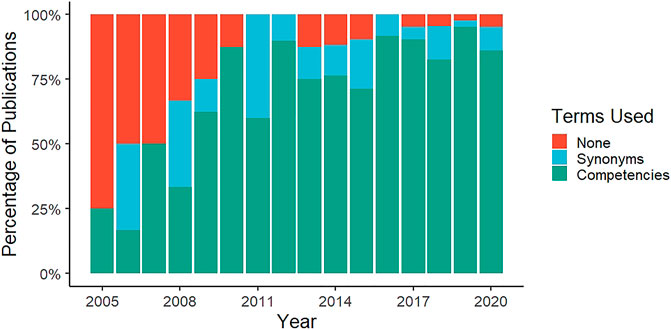
FIGURE 3. Percentage of publications mentioning competencies versus all other synonyms (“literacy” etc.) in title, keywords, or abstract by year (2005–2020) (publications prior to 2005 (n = 10) were excluded for better presentability).
A common theme in the literature is that “no consensus has been reached within ESD discourses as to the process of how to identify essential abilities and as to a list of abilities seen as important” (Wolbring and Burke, 2013). Even as recently as 2021, scholars (and presumably practitioners) continue to operate as though there is “no agreement on exactly what these key competencies are” (McCarthy and Eagle, 2021). This position lends legitimacy to the current practice of continuously re-inventing sustainability competencies in the literature. At the same time, there is little explicit connectivity in the literature, with 40% of the articles (prior to 2019) not being cited by any others (in the whole sample).
Convergence on Key Competencies in Sustainability
Yet, when looking beyond terminological differences, we find convergence in the literature on what graduates and professionals need to be capable of to advance social transformations to sustainability. The 2011 review article “Key competencies in sustainability—a reference framework for academic program development” (Wiek et al., 2011) was the first articulation of this convergence. The authors synthesized from the literature a framework of sustainability-problem solving competence, integrating five key competencies, namely, systems-thinking, anticipatory, normative, strategic, and interpersonal competence. This article has been received as a unifying framework• and identified as “the most influential paper” in ESD (Grosseck et al., 2019, 26). Over the past decade, it has been cited by over 63% (n = 141) of the sampled articles published in 2011 or after (n = 225). The second most cited publication (Rieckmann, 2012) (by 25%) distills expert opinions into a list of competencies, without synthesizing a framework, while the third most cited publication (Barth et al., 2007) (by 21%) focuses on how competencies may be developed rather than offering a framework. Beyond citations, the 2011 key competencies framework has facilitated explicit convergence, being used as the full foundation in 32 articles (14% of the sampled articles published 2011 and after) and as a partial foundation in 78 articles (35%). Mapping this framework over the entire sample (n = 272) between 1997 and 2020 demonstrates convergence on these competencies (Figure 4). Interviews with sustainability professionals have found these competencies to be well recognized (Salovaara et al., 2020). In addition, this framework has been applied in many real-world contexts from university programs (Boone, 2015; Richard et al., 2017; Jarchow et al., 2018) to K-12 teacher training (Archambault et al., 2013; Kieu et al., 2016; Redman et al., 2018), K-12 education directly (Wiek et al., 2016; Rodríguez-Aboytes and Nieto-Caraveo, 2018), and training for in-service professionals (Thomas and Millar, 2016; Withycombe Keeler et al., 2017).
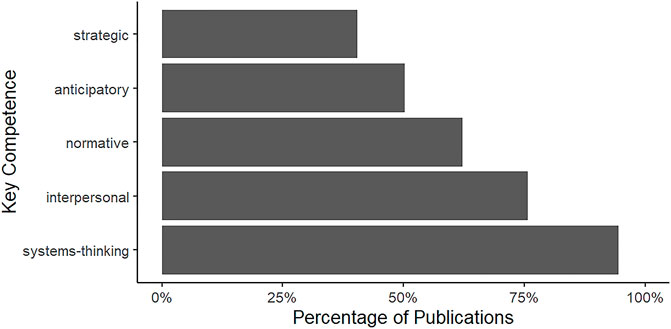
FIGURE 4. Percentage of sampled publications (n = 272) on competencies that can be mapped onto the 2011 framework (1997–2020).
Updating the 2011 Key Competencies Framework
In the ten years since the publication of the 2011 key competencies framework (2011–2020), 110 articles were published that substantively engaged with the framework (beyond just citing it). Analysis of this body of literature identifies both insufficient receptions and productive suggestions relevant to an update (Wiek and Redman, 2021).
Indicative of the deficient, yet prevailing list-approach to competencies, scholars often acknowledge the relevance of the five competencies and then add a competence or two without offering how those might integrate into the framework and specifically contribute to sustainability problem solving (Heiskanen et al., 2016). Beyond the lack of adopting the framework-approach, many articles lack concise definitions and clear conceptual development of new competencies, a flaw called out by several other reviews (Sterling et al., 2017; Galleli et al., 2019; Shephard et al., 2019; Wilhelm et al., 2019; Brundiers et al., 2021). One example is “action competence” (Mogensen and Schnack, 2010), which is frequently added to the 2011 framework, but often confounded with strategic competence (Lans et al., 2014). Another common reception is to emphasize general and disciplinary competencies such as creativity (Steiner and Scherr, 2013; Lozano et al., 2017) or critical thinking (Rieckmann, 2012; Fukushima et al., 2017). As explained in the 2011 framework (p. 211), while these are necessary competencies for solving sustainability problems, they are not key competencies, as they are not distinct to sustainability but considered learning objectives of education in general (Voogt and Roblin, 2012).
Yet, there have also been a number of productive suggestions to expand the framework. Most relevant are three emerging competencies (for definitions, see Table 1), which have been proposed with varying frequencies (Figure 5). Intrapersonal competence has been called out in several conceptual (Anderson, 2013; Frank, 2021) and empirical (Giangrande et al., 2019; Brundiers et al., 2021) studies; yet, there remains some disagreement on whether this is a competence (Gómez-Olmedo et al., 2020) or an underlying disposition (Brundiers et al., 2021). Integration competence has already been mentioned in the original framework (p. 212) and elaborated in an early update of the framework (Wiek et al., 2016); it has been mentioned frequently thereafter (Evans, 2019). The least frequent explicit proposal is for an implementation competence (see Figure 5). The 2011 framework focuses on the competence to plan sustainability problem solving, and only touches on competence to implement sustainability interventions and solutions. Some authors have argued that implementation competence deserves the status of a key competence in sustainability (Perez Salgado et al., 2018), which is in line with other more vague descriptions of strategic action competence (Frisk and Larson, 2012). There is emerging agreement that sustainability education ought to prepare students for taking action (Mogensen and Schnack, 2010; Frisk and Larson, 2012); more specifically, for “collective interventions” (Clark, 2016; Perez Salgado et al., 2018) towards “transformative social change” (Glasser, 2016). As indicated in the original version of the framework (p. 214), this is a call for collective sustainability problem-solving competence that goes beyond the capacity of individuals (Barth, 2015).
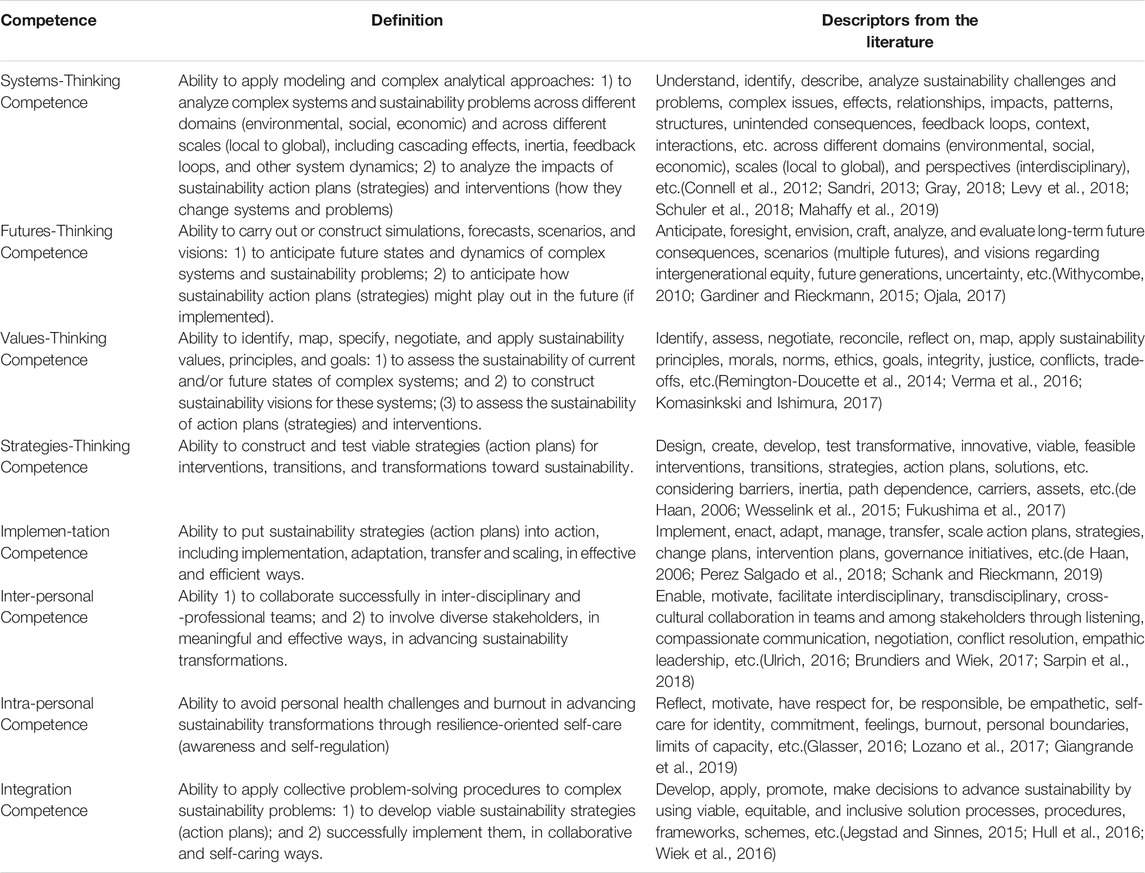
TABLE 1. Definition and most common descriptors from the literature for each key competence in sustainability.
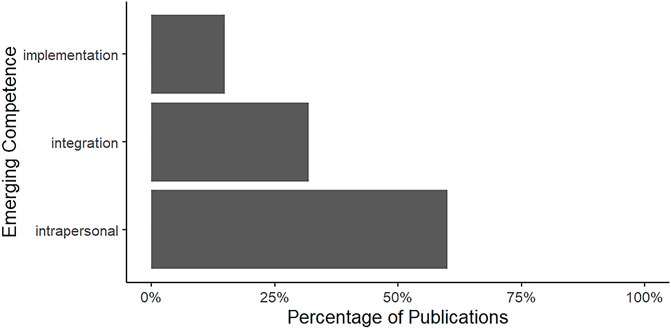
FIGURE 5. Percentage of sampled publications (n = 272) that can be mapped onto the three emerging competencies (1997–2020).
Framework of Competencies for Advancing Sustainability Transformations
The unified framework of competencies for advancing sustainability transformations centers on 8 key competencies in sustainability (with 5 established and 3 emerging), and is complemented by disciplinary, general, and other professional competencies (Figure 6; Table 1). As a framework, the key competencies are not compiled as a list to select from; instead, all key competencies need to be integrated for advancing sustainability transformations. Systems-thinking, futures-thinking, values-thinking, and strategies-thinking enable crafting sustainability action plans that yield sustainability outcomes if successfully implemented (which requires implementation competence). Inter- and intra-personal competencies (key professional competencies) enable that planning and implementation is undertaken in collaborative and self-caring ways—key factors for success (Sipos et al., 2008; Frisk and Larson, 2012). Finally, integration competence enables a coherent combination of collaborative and self-caring planning and implementation efforts, using established procedures for sustainability problem solving (Angelstam et al., 2013; Polk, 2014; Wiek and Lang, 2016; Henry, 2018). Complementary competencies are organized on two axes: disciplinary competencies complement the (content-independent) key competencies through content-dependent expertise; general competencies such as critical thinking and creativity as well as other professional competencies such as responsive project management are generic competencies (used in many different fields) that complement the sustainability-specific key competencies in efforts to advance sustainability transformations.
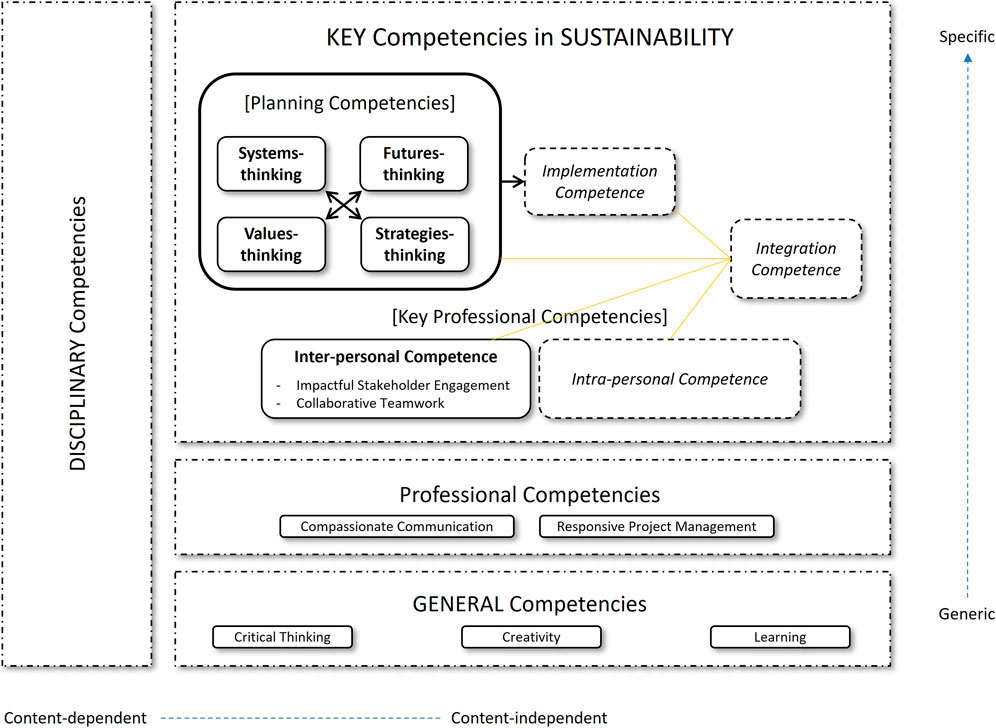
FIGURE 6. Unified framework of competencies for advancing sustainability transformations; centered on 8 key competencies in sustainability with 5 established (bold) and 3 emerging (italic); and complemented by disciplinary, general, and other professional competencies.
Competencies that fulfill important functions complementary to the key competencies in sustainability can be differentiated into disciplinary, general, and other professional competencies.
Disciplinary competence: There is broad agreement that advancing sustainability transformations requires content-dependent competencies, e.g., on climate, water, energy, food, and international development (Dale and Newman, 2005; Demssie et al., 2019). Disciplinary specialties will be critical complements to the content-independent sustainability competencies, resulting in “t-“, “pi” or “shield” shaped professional profiles (Uhlenbrook and de Jong, 2012; Conley et al., 2017; Pennington et al., 2020).
General: Although there are no universally agreed-upon general competencies, Binkley et al. (2012) distilled a broad sample of literature into a set of ten so-called “21st century skills”. Three of these general competencies were also frequently mentioned in the literature reviewed in the present study and can therefore be considered important complementary general competencies for advancing sustainability transformations, namely, the abilities of critical thinking, creativity, and learning.
Professional Competencies: As indicated above, inter- and intra-personal competencies are considered key competencies in sustainability, shared mostly with other caring professions, e.g., medicine, nursing, social work. In addition, two other, more “regular”, professional competencies, namely (advanced) compassionate communication and responsive project management, are important for advancing sustainability transformations on a more basic level (MacDonald and Shriberg, 2016; Brundiers and Wiek, 2017; Lozano et al., 2017).
Discussion
This systematic review of the growing body of literature found, despite appearance to the contrary, a convergence on learning objectives in sustainability education around a discrete set of key competencies. In particular, the five key competencies described through a framework in 2011 (Wiek et al., 2011), namely, systems-thinking, anticipatory, normative, strategic, and interpersonal competence, have gained widespread use. Several productive propositions have emerged as well. Integrating the advances of the last decade, a framework of eight key competencies in sustainability is described, along with three classes of complementary competencies which form the best published scholarly knowledge of how to equip sustainability change agents to advance sustainability transformations. While this study focused on the perspectives captured in the literature, reviews of university sustainability programs (Trencher et al., 2018; Salovaara et al., 2020) and expert surveys (Rieckmann, 2012; Demssie et al., 2019; Brundiers et al., 2021) largely align with the findings presented here.
Zooming into the review results, systems thinking is the most established of the planning competencies, followed by interpersonal competence, which is addressed in many project-based sustainability courses (Konrad et al., 2020) (Figure 4). However, these are the less transformative of the key competencies. Futures-, values-, and strategies-thinking competencies, so far established to a lesser extent, are critical for change that disrupts the status quo (Hsu, 2020). These competencies enable graduates and professionals to envision sustainable futures, based on the SDGs, and develop effective and efficient strategies (action plans) to achieve them.
Beyond this, the three emerging competencies are much more unconventional, if not controversial. First, the aspects included as intrapersonal competence (self-awareness and self-care) are not part of typical learning objectives (Shephard, 2008; Frank, 2021), and do not fit well with how competencies are generally defined (Shephard et al., 2019; Gómez-Olmedo et al., 2020). Yet, this points more to a broader issue in education: medical schools, for example, having long realized they need to address emotional, and not just intellectual development in students (Coombs and Virshup, 1994). Second, while addressing sustainability problems is a common theme in sustainability education at the university level (Brundiers et al., 2010), this does not usually mean fully preparing graduates for doing sustainability (Alvarez and Rogers, 2006). Implementation competence calls for that to change, yet, this is a largely unexplored space for university programs. Finally, this review showed that like other scientists, those in sustainability continue to dissect holistic processes (i.e., problem-solving), into constituent parts (i.e., lists of competencies, as in (Lozano et al., 2017)). Integration competence pushes against this tendency and urges an emphasis on educating for the connections between competencies.
Sustainability science has developed and adopted a variety of approaches to solving problems (Angelstam et al., 2013; Polk, 2014; Wiek and Lang, 2016; Henry, 2018), with initial attempts to explore how that can shape education (Wei et al., 2020). The unified framework centers on how professionals can best collectively engage in sustainability problem solving and advancing sustainability transformations. Through this foundation, the framework is explicitly not intended to serve any specific discipline but should be adoptable by all disciplines and fields (with some relevance to sustainability). The framework offers a base from which to build off and specify learning objectives in life science, engineering, business, or teacher’s education, to name a few. To this end, the language of the unified framework has been further universalized (e.g., “normative” is often mistranslated), and discilenary competencies are now situated within this more extended framework.
The reviewed literature focused on publications in English, which underrepresents large regions of the world; a problem confirmed in other studies (Weiss and Barth, 2019). Indeed, there is, for example, a growing discourse in Latin America (in Spanish) around how to develop sustainability education (Dieleman and Juarez-Najera, 2008). We found that specifically with regards to learning objectives in sustainability little has been published (in English) by researchers from outside the OECD. After many early calls for it (Mochizuki and Fadeeva, 2010), publications from underrepresented countries have recently increased (23 of 25 identified were published in the last 5 years), but more comprehensive inclusion of these perspectives is needed.
Conclusions
The results of this study show that, despite terminological differences, there is substantive convergence in the literature on what change agents need to be capable of to advance social transformations to sustainability. On this basis, the article describes a framework of eight key competencies in sustainability, broadly applicable to sustainability education in all disciplines. The unified framework of key competencies in sustainability links science, education, and society in the joint effort of broadening and accelerating transformations towards the Sustainable Development Goals. This does not mark the endpoint of needed research, rather an opportunity to make much needed advances. Three immediate needs include: 1) research and development of the emerging competencies; 2) operationalization of the framework across disciplines, learning settings, and global contexts; and 3) testing the framework in real-world problem-solving settings. Even more fundamental though is the need for the community of scholars to come together and better coordinate their efforts. Complementary and comparative studies would overcome the current fractured structure of the field and allow for more robust and accelerated advances.
Data Availability Statement
The original contributions presented in the study are included in the article/Supplementary Material, further inquiries can be directed to the corresponding author.
Author Contributions
AR and AW designed the research project together and structured the article and wrote the article together. AW secured the funding, and AR did the data collection and full literature review. Both authors approved the submitted version.
Funding
The authors acknowledge funding from the Lower Saxony Ministry of Science and Culture and Volkswagen Foundation for the Grant “Educating Future Change Agents—Higher Education as a Motor of the Sustainability Transformation” (A115235) through the program “Science for Sustainable Development”.
Conflict of Interest
The authors declare that the research was conducted in the absence of any commercial or financial relationships that could be construed as a potential conflict of interest.
Publisher’s Note
All claims expressed in this article are solely those of the authors and do not necessarily represent those of their affiliated organizations, or those of the publisher, the editors and the reviewers. Any product that may be evaluated in this article, or claim that may be made by its manufacturer, is not guaranteed or endorsed by the publisher.
Acknowledgments
The authors would like to thank Charles Redman, Arizona State University, and Matthias Barth, Leuphana University of Lüneburg, for comments and suggestions on earlier versions of this article.
Supplementary Material
The Supplementary Material for this article can be found online at: https://www.frontiersin.org/articles/10.3389/feduc.2021.785163/full#supplementary-material
References
Alvarez, A., and Rogers, J. (2006). Going “Out There”: Learning about Sustainability in Place. Int. J. Sus. Higher Ed. 7, 176–188. doi:10.1108/14676370610655940
Anderson, M. D. (2013). Higher education revisited: Sustainability science and teaching for sustainable food systems. Future of food: State of the art, challenges and options for action. Editors S. Albrecht, and R. Braun (Cambridge: UIT), 179–188.
Angelstam, P., Andersson, K., Annerstedt, M., Axelsson, R., Elbakidze, M., Garrido, P., et al. (2013). Solving Problems in Social-Ecological Systems: Definition, Practice and Barriers of Transdisciplinary Research. Ambio 42, 254–265. doi:10.1007/s13280-012-0372-4
Archambault, L., Warren, A., and Hartwell, L. (2013). Preparing Future Educators: Sustainability Education Framework for Teachers (SEFT). Society for Information Technology & Teacher Education International Conference, 174–179.
Barrie, S. C. (2006). Understanding what We Mean by the Generic Attributes of Graduates. High. Educ. 51, 215–241. doi:10.1007/s10734-004-6384-7
Barth, M. (2015). Implementing Sustainability in Higher Education: Learning in an Age of Transformation. London: Routledge.
Barth, M., Godemann, J., Rieckmann, M., and Stoltenberg, U. (2007). Developing Key Competencies for Sustainable Development in Higher Education. Int. J. Sus. Higher Ed. 8, 416–430. doi:10.1108/14676370710823582
Binkley, M., Erstad, O., Herman, J., Raizen, S., Ripley, M., Miller-Ricci, M., et al. (2012). “Defining Twenty-First Century Skills,” in Assessment and Teaching of 21st Century Skills (Dordrecht: Springer Netherlands), 17–66. doi:10.1007/978-94-007-2324-5_2:
Boone, C. (2015). On Hope and Agency in Sustainability: Lessons from Arizona State University. J. Sustain. Educ., 10.
Brundiers, K., Barth, M., Cebrián, G., Cohen, M., Diaz, L., Doucette-Remington, S., et al. (2021). Key Competencies in Sustainability in Higher Education-Toward an Agreed-Upon Reference Framework. Sustain. Sci. 16, 13–29. doi:10.1007/s11625-020-00838-2
Brundiers, K., and Wiek, A. (2017). Beyond Interpersonal Competence: Teaching and Learning Professional Skills in Sustainability. Edu. Sci. 7, 39. doi:10.3390/educsci7010039
Brundiers, K., Wiek, A., and Redman, C. L. (2010). Real‐world Learning Opportunities in Sustainability: from Classroom into the Real World. Int. J. Sus. Higher Ed. 11, 308–324. doi:10.1108/14676371011077540
Clark, C. R. (2016). Collective Action Competence: an Asset to Campus Sustainability. Int. J. Sus. Higher Ed. 17, 559–578. doi:10.1108/IJSHE-04-2015-0073
Conley, S. N., Foley, R. W., Gorman, M. E., Denham, J., and Coleman, K. (2017). Acquisition of T-Shaped Expertise: an Exploratory Study. Social Epistemology 31, 165–183. doi:10.1080/02691728.2016.1249435
Connell, K. H., Remington, S., and Armstrong, C. (2012). Assessing Systems Thinking Skills in Two Undergraduate Sustainability Courses: A Comparison of Teaching Strategies. J. Sustain. Educ., 3.
Coombs, R. H., and Virshup, B. B. (1994). Enhancing the Psychological Health of Medical Students: the Student Well-Being Committee. Med. Educ. 28, 47–7. doi:10.1111/j.1365-2923.1994.tb02684.x
Crick, R. D. (2008). Key Competencies for Education in a European Context: Narratives of Accountability or Care. Eur. Educ. Res. J. 7, 311–318. doi:10.2304/eerj.2008.7.3.311
Dale, A., and Newman, L. (2005). Sustainable Development, Education and Literacy. Int. J. Sus. Higher Ed. 6, 351–362. doi:10.1108/14676370510623847
Dawe, G., Jucker, R., and Martin, S. (2005). Sustainable Development in Higher Education: Current Practice and Future Developments. York, United Kingdom: A Rep. High. Educ. Acad.
de Haan, G. (2006). The BLK '21' Programme in Germany: a 'Gestaltungskompetenz'‐based Model for Education for Sustainable Development. Environ. Edu. Res. 12, 19–32. doi:10.1080/13504620500526362
Demssie, Y. N., Wesselink, R., Biemans, H. J. A., and Mulder, M. (2019). Think outside the European Box: Identifying Sustainability Competencies for a Base of the Pyramid Context. J. Clean. Prod. 221, 828–838. doi:10.1016/j.jclepro.2019.02.255
Dieleman, H., and Juarez-Najera, M. (2008). Cómo se puede diseñar educación para la sustentabilidad. Rev. Int. Contam. Ambient. 24, 131–147.
Evans, T. L. (2019). Competencies and Pedagogies for Sustainability Education: A Roadmap for Sustainability Studies Program Development in Colleges and Universities. Sustainability 11, 5526. doi:10.3390/su11195526
Fink, A. (2014). Conducting Research Literature Reviews : From the Internet to Paper. 4th ed. Available at: http://orbis.uottawa.ca/record=b4571892∼S0.
Franco, I., Saito, O., Vaughter, P., Whereat, J., Kanie, N., and Takemoto, K. (2019). Higher Education for Sustainable Development: Actioning the Global Goals in Policy, Curriculum and Practice. Sustain. Sci. 14, 1621–1642. doi:10.1007/s11625-018-0628-4
Frank, P. (2021). A Proposal of Personal Competencies for Sustainable Consumption. Int. J. Sustain. High. Educ. 22, 1225–1245. doi:10.1108/IJSHE-01-2020-0027
Frisk, E., and Larson, K. L. (2011). Educating for Sustainability: Competencies & Practices for Transformative Action. J. Sustain. Educ, 2.
Fukushima, Y., Ishimura, G., Komasinski, A. J., Omoto, R., and Managi, S. (2017). Education and Capacity Building with Research: a Possible Case for Future Earth. Int. J. Sus. Higher Ed. 18, 263–276. doi:10.1108/IJSHE-10-2015-0170
Galleli, B., Hourneaux Jr, F., and Munck, L. (2019). Sustainability and Human Competences: a Systematic Literature Review. Bij 27, 1981–2004. doi:10.1108/BIJ-12-2018-0433
Gardiner, S., and Rieckmann, M. (2015). Pedagogies of Preparedness: Use of Reflective Journals in the Operationalisation and Development of Anticipatory Competence. Sustainability 7, 10554–10575. doi:10.3390/su70810554
Giangrande, N., White, R. M., East, M., Jackson, R., Clarke, T., Saloff Coste, M., et al. (2019). A Competency Framework to Assess and Activate Education for Sustainable Development: Addressing the UN Sustainable Development Goals 4.7 Challenge. Sustainability 11, 2832. doi:10.3390/su11102832
Glasser, H. (2016). Toward the Development of Robust Learning for Sustainability Core Competencies. Sustainability: J. Rec. 9, 121–134. doi:10.1089/sus.2016.29054.hg
Gómez-Olmedo, A. M., Valor, C., and Carrero, I. (2020). Mindfulness in Education for Sustainable Development to Nurture Socioemotional Competencies: a Systematic Review and Meta-Analysis. Environ. Edu. Res. 26, 1527–1555. doi:10.1080/13504622.2020.1777264
Gordon, I. J., Bawa, K., Bammer, G., Boone, C., Dunne, J., Hart, D., et al. (2019). Forging Future Organizational Leaders for Sustainability Science. Nat. Sustain. 2, 647–649. doi:10.1038/s41893-019-0357-4
Gray, S. (2018). Measuring Systems Thinking. Nat. Sustain. 1, 388–389. doi:10.1038/s41893-018-0121-1
Grosseck, G., Țîru, L. G., and Bran, R. A. (2019). Education for Sustainable Development: Evolution and Perspectives: A Bibliometric Review of Research, 1992-2018. Sustainability 11, 6136. doi:10.3390/su11216136
Hallinger, P., and Chatpinyakoop, C. (2019). A Bibliometric Review of Research on Higher Education for Sustainable Development, 1998-2018. Sustainability 11, 2401. doi:10.3390/su11082401
Heiskanen, E., Thidell, A., and Rodhe, H. (2016). Educating Sustainability Change Agents: the Importance of Practical Skills and Experience. J. Clean. Prod. 123, 218–226. doi:10.1016/j.jclepro.2015.11.063
Henry, A. D. (2018). Learning Sustainability Innovations. Nat. Sustain. 1, 164–165. doi:10.1038/s41893-018-0053-9
Hsu, L. P. (2020). Visioning the Future: Evaluating Learning Outcomes and Impacts of Futures-Oriented Education. J. Futur. Stud. 24, 103–116. doi:10.6531/JFS.202006_24(4).0011
Hull, R. B., Kimmel, C., Robertson, D. P., and Mortimer, M. (2016). International Field Experiences Promote Professional Development for Sustainability Leaders. Int. J. Sustain. High. Educ. 17, 86–104. doi:10.1108/IJSHE-07-2014-0105
Jarchow, M. E., Formisano, P., Nordyke, S., and Sayre, M. (2018). Measuring Longitudinal Student Performance on Student Learning Outcomes in Sustainability Education. Int. J. Sustain. High. Educ. 19, 547–565. doi:10.1108/IJSHE-11-2016-0200
Jegstad, K. M., and Sinnes, A. T. (2015). Chemistry Teaching for the Future: A Model for Secondary Chemistry Education for Sustainable Development. Int. J. Sci. Edu. 37, 655–683. doi:10.1080/09500693.2014.1003988
Kieu, T. K., Singer, J., and Gannon, T. J. (2016). Education for Sustainable Development in Vietnam: Lessons Learned from Teacher Education. Int. J. Sus. Higher Ed. 17, 853–874. doi:10.1108/ijshe-05-2015-0098
Komasinkski, A., and Ishimura, G. (2017). Critical Thinking and Normative Competencies for Sustainability Science Education. J. High. Educ. Lifelong Learn. 24, 21–37. doi:10.14943/J.HighEdu.24.21
Konrad, T., Wiek, A., and Barth, M. (2020). Embracing Conflicts for Interpersonal Competence Development in Project-Based Sustainability Courses. Int. J. Sus. Higher Ed. 21, 76–96. doi:10.1108/IJSHE-06-2019-0190
Lans, T., Blok, V., and Wesselink, R. (2014). Learning Apart and Together: towards an Integrated Competence Framework for Sustainable Entrepreneurship in Higher Education. J. Clean. Prod. 62, 37–47. doi:10.1016/j.jclepro.2013.03.036
Levy, M. A., Lubell, M. N., and McRoberts, N. (2018). The Structure of Mental Models of Sustainable Agriculture. Nat. Sustain. 1, 413–420. doi:10.1038/s41893-018-0116-y
Linnér, B.-O., and Wibeck, V. (2019). Sustainability Transformations: Agents and Drivers across Societies. Cambridge University Press. doi:10.1017/9781108766975
Lozano, R., Merrill, M., Sammalisto, K., Ceulemans, K., and Lozano, F. (2017). Connecting Competences and Pedagogical Approaches for Sustainable Development in Higher Education: A Literature Review and Framework Proposal. Sustainability 9, 1889. doi:10.3390/su9101889
MacDonald, L., and Shriberg, M. (2016). Sustainability Leadership Programs in Higher Education: Alumni Outcomes and Impacts. J. Environ. Stud. Sci. 6, 360–370. doi:10.1007/s13412-015-0344-7
Mahaffy, P. G., Matlin, S. A., Holme, T. A., and MacKellar, J. (2019). Systems Thinking for Education about the Molecular Basis of Sustainability. Nat. Sustain. 2, 362–370. doi:10.1038/s41893-019-0285-3
McCarthy, B., and Eagle, L. (2021). Are the Sustainability-Oriented Skills and Competencies of Business Graduates Meeting or Missing Employers’ Needs? Perspectives of Regional Employers. Aust. J. Environ. Educ.
Mochizuki, Y. (2016). Educating for Transforming Our World: Revisiting International Debates Surrounding Education for Sustainable Development. Curr. Issues Comp. Educ. 19, 109–125.
Mochizuki, Y., and Fadeeva, Z. (2010). Competences for Sustainable Development and Sustainability. Int. J. Sus. Higher Ed. 11, 391–403. doi:10.1108/14676371011077603
Mogensen, F., and Schnack, K. (2010). The Action Competence Approach and the 'new' Discourses of Education for Sustainable Development, Competence and Quality Criteria. Environ. Edu. Res. 16, 59–74. doi:10.1080/13504620903504032
O’Byrne, D., Dripps, W., and Nicholas, K. A. (2015). Teaching and Learning Sustainability: An Assessment of the Curriculum Content and Structure of Sustainability Degree Programs in Higher Education. Sustain. Sci. 10, 43–59. doi:10.1007/s11625-014-0251-y
Ojala, M. (2017). Hope and Anticipation in Education for a Sustainable Future. Futures 94, 76–84. doi:10.1016/j.futures.2016.10.004
Pennington, D., Ebert-Uphoff, I., Freed, N., Martin, J., and Pierce, S. A. (2020). Bridging Sustainability Science, Earth Science, and Data Science through Interdisciplinary Education. Sustain. Sci. 15, 647–661. doi:10.1007/s11625-019-00735-3
Perez Salgado, F., Abbott, D., and Wilson, G. (2018). Dimensions of Professional Competences for Interventions towards Sustainability. Sustain. Sci. 13, 163–177. doi:10.1007/s11625-017-0439-z
Polk, M. (2014). Achieving the Promise of Transdisciplinarity: a Critical Exploration of the Relationship between Transdisciplinary Research and Societal Problem Solving. Sustain. Sci. 9, 439–451. doi:10.1007/s11625-014-0247-7
Redman, A., Rowe, D., Brundiers, K., and Brock, A. (2021). What Motivates Students to Be Sustainability Change Agents in the Face of Adversity. Sustainability Clim. Change 14, 313–322. doi:10.1089/scc.2021.0024
Redman, E., Wiek, A., and Redman, A. (2018). Continuing Professional Development in Sustainability Education for K-12 Teachers: Principles, Programme, Applications, Outlook. J. Edu. Sust. Dev. 12, 59–80. doi:10.1177/2455133318777182
Remington‐Doucette, S. M., Hiller Connell, K. Y., Armstrong, C. M., and Musgrove, S. L. (2013). Assessing Sustainability Education in a Transdisciplinary Undergraduate Course Focused on Real‐world Problem Solving. Int. J. Sus. Higher Ed. 14, 404–433. doi:10.1108/IJSHE-01-2012-0001
Richard, V., Forget, D., and Gonzalez-Bautista, N. (2017). “Implementing Sustainability in the Classroom at Université Laval,” in Handbook of Theory and Practice of Sustainable Development in Higher Education (Cham, Switzerland), 133–147. doi:10.1007/978-3-319-47895-1_9
Rieckmann, M. (2012). Future-oriented Higher Education: Which Key Competencies Should Be Fostered through university Teaching and Learning. Futures 44, 127–135. doi:10.1016/j.futures.2011.09.005
Rodríguez-Aboytes, J. G., and Nieto-Caraveo, L. M. (2018). “Assessment of Competencies for Sustainability in Secondary Education in México,” in. ambiental.uaslp.mx.
Rychen, D. S., and Salganik, L. H. (2000). “Definition and Selection of Key Competencies,” in Fourth General Assembly of the OECD Education Indicators Programme (Tokyo, Japan), 61–73.
Salovaara, J. J., Soini, K., and Pietikäinen, J. (2020). Sustainability Science in Education: Analysis of Master's Programmes' Curricula. Sustain. Sci. 15, 901–915. doi:10.1007/s11625-019-00745-1
Sandri, O. J. (2013). Threshold Concepts, Systems and Learning for Sustainability. Environ. Edu. Res. 19, 810–822. doi:10.1080/13504622.2012.753413
Sarpin, N., Kasim, N., Zainal, R., and Noh, H. M. (2018). “A Guideline for Interpersonal Capabilities Enhancement to Support Sustainable Facility Management Practice,” in IOP Conference Series: Earth and Environmental Science (Institute of Physics Publishing), Langkawi, Malaysia, 4–5 December 2017 (OP Publishing Ltd), 012116. doi:10.1088/1755-1315/140/1/012116
Schank, C., and Rieckmann, M. (2019). Socio-economically Substantiated Education for Sustainable Development: Development of Competencies and Value Orientations between Individual Responsibility and Structural Transformation. J. Edu. Sust. Dev. 13, 67–91. doi:10.1177/0973408219844849
Schuler, S., Fanta, D., Rosenkraenzer, F., and Riess, W. (2018). Systems Thinking within the Scope of Education for Sustainable Development (ESD) - a Heuristic Competence Model as a Basis for (Science) Teacher Education. J. Geogr. Higher Edu. 42, 192–204. doi:10.1080/03098265.2017.1339264
Scoones, I., Stirling, A., Abrol, D., Atela, J., Charli-Joseph, L., Eakin, H., et al. (2020). Transformations to Sustainability: Combining Structural, Systemic and Enabling Approaches. Curr. Opin. Environ. Sustainability 42, 65–75. doi:10.1016/j.cosust.2019.12.004
Shephard, K. (2008). Higher Education for Sustainability: Seeking Affective Learning Outcomes. Int. J. Sus. Higher Ed. 9, 87–98. doi:10.1108/14676370810842201
Shephard, K., Rieckmann, M., and Barth, M. (2019). Seeking Sustainability Competence and Capability in the ESD and HESD Literature: an International Philosophical Hermeneutic Analysis. Environ. Edu. Res. 25, 532–547. doi:10.1080/13504622.2018.1490947
Sipos, Y., Battisti, B., and Grimm, K. (2008). Achieving Transformative Sustainability Learning: Engaging Head, Hands and Heart. Int. J. Sustain. High. Educ. 9, 68–86. doi:10.1108/14676370810842193
Snyder, H. (2019). Literature Review as a Research Methodology: An Overview and Guidelines. J. Business Res. 104, 333–339. doi:10.1016/j.jbusres.2019.07.039
Steiner, G., and Scherr, J. (2013). Higher Education for Complex Real-World Problems and Innovation: A Tribute to Heufler's Industrial Design Approach. Ce 04, 130–136. doi:10.4236/ce.2013.47A2016
Sterling, S., Glasser, H., Rieckmann, M., and Warwick, P. (2017). Envisioning futures for environmental and sustainability education. Envisioning futures for environmental and sustainability education. Editors P. B. Corcoran, J. P. Weakland, and A. E. J. Wals (The Netherlands: Wageningen Academic Publishers), 153–168. doi:10.3920/978-90-8686-846-9_10
Thomas, I., and Millar, S. (2016). Sustainability, Education and Local Government: Insights from the Australian State of Victoria. Local Environ. 21, 1482–1499. doi:10.1080/13549839.2016.1140131
Trencher, G., Vincent, S., Bahr, K., Kudo, S., Markham, K., and Yamanaka, Y. (2018). Evaluating Core Competencies Development in Sustainability and Environmental Master's Programs: An Empirical Analysis. J. Clean. Prod. 181, 829–841. doi:10.1016/j.jclepro.2018.01.164
Uhlenbrook, S., and de Jong, E. (2012). T-shaped Competency Profile for Water Professionals of the Future. Hydrol. Earth Syst. Sci. 16, 3475–3483. doi:10.5194/hess-16-3475-2012
Ulrich, M. E. (2016). Learning Relational Ways of Being: What Globally Engaged Scholars Have Learned about Global Engagement and Sustainable Community Development.
Van Dam-Mieras, R., Lansu, A., Rieckmann, M., and Michelsen, G. (2008). Development of an Interdisciplinary, Intercultural Master's Program on Sustainability: Learning from the Richness of Diversity. Innov. High. Educ. 32, 251–264. doi:10.1007/s10755-007-9055-7
Verma, P., Vaughan, K., Martin, K., Pulitano, E., Garrett, J., and Piirto, D. D. (2016). Integrating Indigenous Knowledge and Western Science into Forestry, Natural Resources, and Environmental Programs. J. For. 114, 648–655. doi:10.5849/jof.15-090
Vincent, S., and Focht, W. (2009). US Higher Education Environmental Program Managers' Perspectives on Curriculum Design and Core Competencies. Int. J. Sus. Higher Ed. 10, 164–183. doi:10.1108/14676370910945963
Voogt, J., and Roblin, N. P. (2012). A Comparative Analysis of International Frameworks for 21stcentury Competences: Implications for National Curriculum Policies. J. Curriculum Stud. 44, 299–321. doi:10.1080/00220272.2012.668938
Wei, C. A., Deaton, M. L., Shume, T. J., Berardo, R., and Burnside, W. R. (2020). A Framework for Teaching Socio-Environmental Problem-Solving. J. Environ. Stud. Sci. 10, 467–477. doi:10.1007/s13412-020-00603-y
Weiss, M., and Barth, M. (2019). Global Research Landscape of Sustainability Curricula Implementation in Higher Education. Int. J. Sus. Higher Ed. 20, 570–589. doi:10.1108/IJSHE-10-2018-0190
Wesselink, R., Blok, V., van Leur, S., Lans, T., and Dentoni, D. (2015). Individual Competencies for Managers Engaged in Corporate Sustainable Management Practices. J. Clean. Prod. 106, 497–506. doi:10.1016/j.jclepro.2014.10.093
Wiek, A., Bernstein, M. J., Rider, W. F., Cohen, M., Forrest, N., Kuzdas, C., et al. (2016). “Operationalising Competencies in Higher Education for Sustainable Development,” in Handbook of Higher Education for Sustainable Development. Editors M. Barth, G. Michelsen, M. Rieckmann, and I. Thomas (London: Routledge), 297–317.
Wiek, A., and Lang, D. J. (2016). “Transformational Sustainability Research Methodology,” in Sustainability Science: An Introduction. Editors H. Heinrichs, P. Martens, G. Michelsen, and A. Wiek (New York, Berlin: Springer), 31–41. doi:10.1007/978-94-017-7242-6
Wiek, A., and Redman, A. (2021). “What Do Key Competencies in Sustainability Offer and How to Use Them,” in Competencies in Education for Sustainable Development – Critical Perspectives. Editors P. Vare, N. Lausselet, and M. Rieckmann (New York, Berlin: Springer).
Wiek, A., Withycombe, L., and Redman, C. L. (2011). Key Competencies in Sustainability: a Reference Framework for Academic Program Development. Sustain. Sci. 6, 203–218. doi:10.1007/s11625-011-0132-6
Wilhelm, S., Förster, R., and Zimmermann, A. (2019). Implementing Competence Orientation: Towards Constructively Aligned Education for Sustainable Development in University-Level Teaching-And-Learning. Sustainability 11, 1891. doi:10.3390/su11071891
Withycombe, L. K. (2010). Anticipatory Competence as a Key Competence in Sustainability Education. Master Thesis, School of Sustainability, Arizona State University.
Withycombe Keeler, L., Gabriele, A., Kay, B. R., and Wiek, A. (2017). Future Shocks and City Resilience: Building Organizational Capacity for Resilience and Sustainability through Game Play and Ways of Thinking. Sustain. J. Rec. 10, 282. doi:10.1089/sus.2017.0011
Keywords: learning objectives, sustainability education, transformations, change agents, key competencies in sustainability
Citation: Redman A and Wiek A (2021) Competencies for Advancing Transformations Towards Sustainability. Front. Educ. 6:785163. doi: 10.3389/feduc.2021.785163
Received: 28 September 2021; Accepted: 04 November 2021;
Published: 30 November 2021.
Edited by:
Marco Rieckmann, University of Vechta, GermanyReviewed by:
Renate Wesselink, Wageningen University and Research, NetherlandsJana Dlouhá, Charles University, Czechia
Copyright © 2021 Redman and Wiek. This is an open-access article distributed under the terms of the Creative Commons Attribution License (CC BY). The use, distribution or reproduction in other forums is permitted, provided the original author(s) and the copyright owner(s) are credited and that the original publication in this journal is cited, in accordance with accepted academic practice. No use, distribution or reproduction is permitted which does not comply with these terms.
*Correspondence: Aaron Redman, YWFyb24ucmVkbWFuQGFzdS5lZHU=
 Aaron Redman
Aaron Redman Arnim Wiek
Arnim Wiek